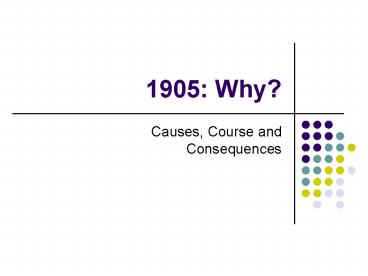1905: Why - PowerPoint PPT Presentation
1 / 22
Title:
1905: Why
Description:
Think about the things which motivated those who marched on ... Industrial Workers: Proletariat repressed even more Soviets disbanded with the use of force. ... – PowerPoint PPT presentation
Number of Views:28
Avg rating:3.0/5.0
Title: 1905: Why
1
1905 Why?
Causes, Course and Consequences
2
Key Questions
- Think about the things which motivated those who
marched on St Petersburg - What actually happened during the course of 1905?
- Reasons why the events of 1905 are significant?
3
Resources and References
- Lynch
- Traynor
- Heinemann
- Morrison, History Review, Dec. 2000 (article).
4
Definitions
- Revolution
- A usually violent coup detat which replaces
the previous system of government with another
system, and often involves a change of
leadership. - The replacement of one ruling class by another.
5
What do you normally expect to happen in a
revolution?
6
Causes Surface
- Russo-Japanese War
- Political repression and counter reforms
- maintain this form of government except by
violence - Famine in the villages and peasant riots.
- Heavy taxation and fear losing lands through
mortgage default. - Government incompetence
- Growing class-consciousness.
7
Bloody Sunday.massacre of unarmed
petitioners Lynch.
- 22nd January 1905
- Father Gapon (Okhrana secret agent) leader.
- 200,000 people take petition to Winter Palace
- Cossacks shoot at protestors
- 100s killed
8
Course of 1905
Father Gapon had also written the petition that
was to be presented in the Winter Palace. An
eight-hour working day and universal suffrage
were the main demands.
- See extra sheets.
9
(No Transcript)
10
(No Transcript)
11
(No Transcript)
12
(No Transcript)
13
Causes 1
Political Policies of reaction and
Russification Increase in Russian Liberalism
combined with lack of political reforms (Zemstva
Senseless dreams)
14
Causes 2
Social Population growth Peasants collected
together in towns in order to earn money. New
urban proletariat unhappy with working conditions
- half a million strike in January. Peasants
unhappy about redemption payments.
15
Causes 3
Economic Rapid industrial expansion Land hunger
peasants seizing land, attacks on landlords
estates, illegal pasteurising. Working conditions
poor long hours, low pay.
16
Causes 4
Military Defeats suffered during the
Russo-Japanese War (loss of Port Arthur) Low
morale amongst soldiers because of defeats
soldiers mutiny on the Trans-Siberian railway
wanting to come home.
17
Effect 1
- Tarnishes Nicholass image
- From Little Father to Bloody Nick
- Strikes across the country
- Increase in terrorist activity organised by the
SRs - Minority states declare independence (e.g.
Georgia) - June 1905 Potemkin crew murder officers
- August 1905 End of Russo-Japanese War
- Autumn 1905 General Strike
18
Effect 2
- Moscow and St Petersburg Soviets formed.
(Menshevik Trotsky becomes Chairman of the St
Petersburg Soviet - October Manifesto formulated
- Who was affected by the Manifesto?
- Liberals Legislative Duma granted.
- Civil Rights promised freedom of speech,
assembly, worship, legalising of trade unions - Peasants November 1905 - mortgage repayment for
peasants abolished - Industrial Workers Proletariat repressed even
more Soviets disbanded with the use of force.
19
Significance
- Revolution occurred in spite of them the
Revolutionaries rather than because of them.
LYNCH - The autocracy emerged stronger as a result.
(Mutinies did not continue loyal troops and
destroy the soviets) - Readiness of groups to accept Tsars concession
shows that Liberals/Peasants did not really want
revolutionary change. - Concessions not real but expedient.
- 1906 Fundamental Laws reasserted the power of the
Tsar over the state. - Dress rehearsal for 1917 Trotsky.
20
Lessons of 1905
- If the Tsar and army kept its nerve, protest
would find it difficult to mount a serious
challenge. - Questioned how much liberals wanted change.
- Trosky strikers and protestors were disunited
and inexperienced. - Liberals had backed the revolution and then left
the workers at the mercy of the army. - Although with a couple of broken ribs, (the
Tsarist system) had come out of the experience of
1905 alive and strong.
21
Why was the Tsar able to survive the 1905
revolution?
22
Was There a Revolution in Russia in 1905?































